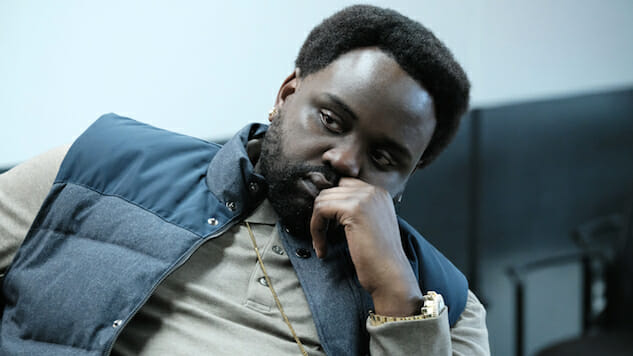Atlanta Test Drives a New Kind of Relationship in “Barbershop”
(Episode 2.05)
Photo: Guy D'Alema/FX
Last week’s Oktoberfest-themed breakup between Earn (series creator Donald Glover, who also directed this week’s episode) and Van (Zazie Beetz) was the explosive fizz of stifled feelings. After its bleak outcome tested even the cynicism of Atlanta’s jaded audience, the series decides—in a change of pace—to turn to avenues of more typically successful, open, and intimate communication. Specifically, those between a black man and his barber.
In “Barbershop,” Alfred “Paper Boi” Miles (Brian Tyree Henry) and his guy Bibby (Robert Powell III) battle each other in the art of conversation—only this time on the opposite end of the talkativity spectrum. Where Earn and Van’s familiarity operated with motion, assumptions, and subtext, Alfred and Bibby’s balance is struck by being at constant odds despite continually airing their opinions. Alfred just wants a haircut for an upcoming photoshoot. Bibby hears this, understands this, and seemingly wants to do anything else.
The intimacy in this relationship is one of hair trust. When you find someone that can do it right, you develop trust so deep it can be bent and twisted into all sorts of absurd pretzels without snapping. You’ll make justifications all day because you know, as the James Bond song says, Nobody Does It Better. It’s like love. Or at least good sex. Channeling the physicality of those gags, Bibby and Alfred become a tag-team comedy duo where Bibby’s Bluetooth patter and casually Stoogey elbow-lean on top of Alfred’s head is answered with the latter’s briefly flared nostrils and Moe-like frustrations. But neither can quit the other.
Even if Alfred’s dragged into at least three crimes. Vehicular assault? Check. Theft? Check. Fraud? Probably good to throw that one in there somewhere too. The absolute weirdness of the places Bibby goes makes Alfred’s dedication all the better—and almost all the more understandable. The ability to have a “usual” already invites (and justifies) the unusual. Going to a stranger and getting a strange result doesn’t ask nearly as much of someone as tolerating the eccentricities of a stupid, supposedly safe, and self-loathed (but never altered) choice. Loyalty works both ways here, even if one side is clearly taking advantage of the other and the constant harassment of Paper Boi is wearing thin.
Those Stefani Robinson-penned tangents are hilarious, though. Henry’s magician flourish with a barber cape is the mid-scene throwaway gag to end all mid-scene throwaway gags. In signature Atlanta style, the series goes high, low, and downright weird with its comedy, all in a single episode with relatively few characters. Plus, I’ll never tire of roasting the lightweight Keanu and Hollywood’s treatment of black creators, especially as screenwriter Jordan Peele went on to direct Get Out quickly after obtaining more creative control. “They dressed a cat up like a nigga instead of putting two niggas that made the movie on the poster,” Bibby laments of the former Key- and Peele-led feature, on one of his many attention-deficient tirades.
Powell has the talented tempo of Chris Tucker on his best days, the hustling charisma of Bernie Mac at his scoundreliest, and the wild desperation of Charlie Day’s It’s Always Sunny character. He lays it on thick, fast, and smooth, like a good peanut butter sandwich that simply gums up anyone’s attempts to shut him up. His eyes bug at wasted leftovers but he conjures excuses without breaking eye contact for an instant. It’s pure stardom, an extreme character that feels right at home.
That he’s able to achieve this is partially thanks to the episode’s Seinfeld-ian structure, where a simple task is trying to be achieved and the minor debris of life keeps knocking our shaggy Sisyphus back down the hill. But, like that boulder-pushing rat race, the quest for the right haircut is one that simply can’t be avoided. If you try to get out of it, say by switching barbers, not only do you betray an intimate relationship, you reveal your own inadequate understanding of your needs. If Sisyphus was freed, you bet he’d be back pushing some heavy nonsense up some hill before you know it. Just so he could feel right. So which god did Paper Boi piss off?
Jacob Oller is a writer and film critic whose writing has appeared in The Guardian, Playboy, Roger Ebert, Film School Rejects, Chicagoist, Vague Visages, and other publications. He lives in Chicago, plays Dungeons and Dragons, and struggles not to kill his two cats daily. You can follow him on Twitter here: @jacoboller.







































